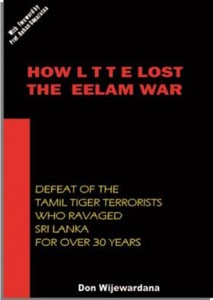STUDY REVEALS FIGHTING ON THE GROUND WAS ONLY PART OF A MAJOR WAR THE GOVERNMENT FOUGHT SILENTLY ON SEVERAL OTHER FRONTS
Posted on January 20th, 2010
PRESS RELEASE
A new book released this week following an intensive study of Eelam War IV concludes that while winning the ground war itself was a remarkable feat the government was fighting on many other fronts at the same time to secure victory on the ground. They included pressure from a number of key western governments to call a ceasefire to allow them to rescue Prabhakaran and other top LTTE leaders and their families, ban on selling arms to Sri Lankan government by United States and the European Union countries, cutting down foreign aid, arms suppliers to the government reneging on their contractual obligations due to pressure from western governments, as well asƒÆ’-¡ƒ”š‚ efforts to get the UN Security Council to stop the war, threats to bring the countryƒÆ’‚¢ƒ¢-¡‚¬ƒ¢-¾‚¢s political and military leadership before an international tribunal for violation of human rights and many others.

ƒÆ’-¡ƒ”š‚ This is one of the findings of a study undertaken by an international researcher Don Wijewardana in a book titled ƒÆ’‚¢ƒ¢-¡‚¬ƒ…-HOW LTTE LOST THE EELAM WARƒÆ’‚¢ƒ¢-¡‚¬ƒ”š‚ published by Stamford Lake (pvt) Ltd. Foreword to the book has been written by world renowned expert on terrorism Professor Rohan Gunaratna.
ƒÆ’-¡ƒ”š‚ This is the first time that such an apolitical and objective study of the issue has been undertaken.
ƒÆ’-¡ƒ”š‚ Referring to the unprecedented outcome of the war the study concludes that it was the result of a well coordinated team effort led by the Commander in Chief Mahinda Rajapaksa, coordinated by the Secretary of Defence Gotabhaya Rajapaksa and fought by the security forces led by the army. The winning strategy included ten key elements: among them were RajapaksaƒÆ’‚¢ƒ¢-¡‚¬ƒ¢-¾‚¢s ability to delegate and allow professionals to fight the war without interference, ensure necessary supplies to the security forces, developing close relationships with key countries such as China and Russia who are permanent members of the UN Security Council, to offset western pressure. The most critical among them was RajapaksaƒÆ’‚¢ƒ¢-¡‚¬ƒ¢-¾‚¢s steadfast refusal to allow any intervention or listen to the persistent calls for a ceasefire that won the day.
ƒÆ’-¡ƒ”š‚ The study also highlights a series of monumental blunders by Prabhakaran that played into RajapaksaƒÆ’‚¢ƒ¢-¡‚¬ƒ¢-¾‚¢s hands. They included, among other things, underestimating Rajapaksa, assassination of the former Indian Prime Minister Rajiv Gandhi, and resorting to killing as the way to achieve Eelam.
ƒÆ’-¡ƒ”š‚ Internally, the Ceasefire Agreement signed with the LTTE in 2002 had created formidable obstacles to the war effort. The study notes that while tying the hands of the government behind its back it allowed the LTTE to rest and rearm in preparation for the war. During this period the terrorists also had considerable help from foreign governments to acquire arms and get advanced training for cadres. At the same time the government faced an internationally orchestrated effort to pressure it to stop the ƒÆ’‚¢ƒ¢-¡‚¬ƒ…-Unwinnable warƒÆ’‚¢ƒ¢-¡‚¬ƒ”š‚ and calling for a ceasefire without wasting public funds trying to defeat the ƒÆ’‚¢ƒ¢-¡‚¬ƒ…-invincibleƒÆ’‚¢ƒ¢-¡‚¬ƒ”š‚ LTTE.ƒÆ’-¡ƒ”š‚ Identifying a ten-point strategy by Rajapaksa to win the war the study says it was RajapaksaƒÆ’‚¢ƒ¢-¡‚¬ƒ¢-¾‚¢s steadfast refusal to allow any intervention or listen to the persistent calls for a ceasefire that won the day.
ƒÆ’-¡ƒ”š‚ Looking at the future the study calls for efforts to build bridges with both the international community and the Tamil Diaspora since the end of the war offers tremendous opportunities to recover from the damage caused by the 30 year war.
ƒÆ’-¡ƒ”š‚ In his foreword to the book Professor Rohan Gunaratna notes that in many ways, future peace in Sri Lanka will depend on the ability and willingness of the Sri Lankan government to enhance its coverage of threats in Sri Lanka, dismantle the LTTE network overseas and to rebuild broken bridges to the Tamil communities both at home and overseas. He also underlines thatƒÆ’-¡ƒ”š‚ ƒÆ’-¡ƒ”š‚ in a globalized world, Sri Lanka cannot survive without the goodwill of the international community, the group of most powerful countries in the West. For this Sri Lanka will need to conceive, craft and implement a post- Prabhakaran strategy.
ƒÆ’-¡ƒ”š‚ For further information contact:
ƒÆ’-¡ƒ”š‚ Don Wijewardana, Tel. +64 4 3844566, +64 27 4844137; Email: donwije@paradise.net.nz
Niroshana Jayasundera, Stamford Lake (pvt) Ltd ƒÆ’‚¢ƒ¢-¡‚¬ƒ¢¢”š¬…” Tel. 011 2846002, 077 7727363; email: niroshanajay@gmail.com